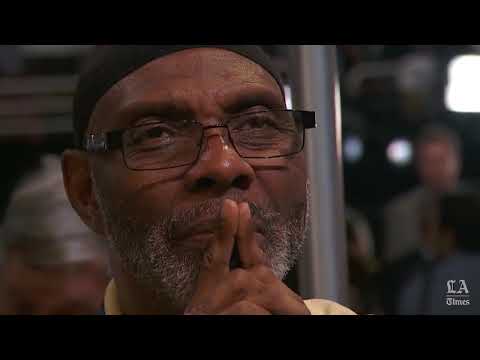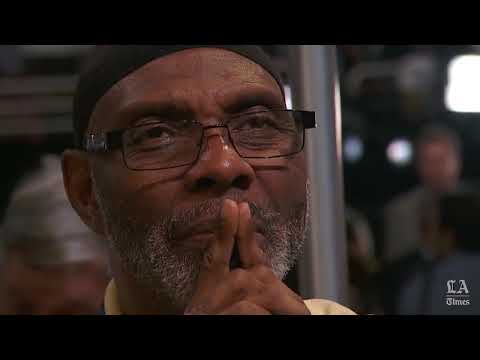Reporting from Washington — Donald Trump’s relations with the Republican Party – and his political fortunes – worsened dramatically Wednesday, as party leaders fretted openly about the inability of his campaign staff to control him and even began to discuss what to do if their unpredictable nominee suddenly quit the race.
“A sense of panic is rising” among GOP elected officials and operatives, said Ed Rogers, a former Republican White House official.
“Serious, senior lawyers” have begun researching how the rules would work if the party had to replace Trump on the ticket, a senior GOP figure in Washington with close ties to the party hierarchy confirmed.
Though the chance of Trump quitting remains extremely unlikely, the fact that Republican officials were conducting such semi-open discussions spoke loudly about how far panic has spread, prompted by Trump’s actions of the last few days: his extended quarrel with the family of a soldier killed in action, his pointed refusal to endorse House Speaker Paul D. Ryan and Sen. John McCain in their GOP primaries, and even less weighty matters like telling the mother of a crying baby to leave a rally. His volatility — and wishful thinking on the part of some — forced party leaders to reckon with any possible turn of events, including Trump ending his candidacy.
Election 2016 | Live coverage on Trail Guide | Sign up for the newsletter
Republican officials can’t force Trump out of the race, and the strong support he still has from many GOP voters makes elected officials reluctant to publicly oppose him. But their plotting makes clear the extent to which he is likely to be running alone, without the kind of help he was depending on from the party’s more organized campaign apparatus.
“He just seems willfully destructive and willfully sort of sadistic about other Republicans,” said Rick Wilson, a Florida-based GOP consultant who has spoken out against Trump for more than a year. “Finally, people are like, ‘No more. We’re done. We’re not playing this game anymore.’”
All of the flareups point to a singular frustration: Trump’s refusal to take advice.

Khizr Khan, the father of a soldier killed in Iraq, speaks at the Democratic National Convention.
Combined, they have also helped restore Hillary Clinton to a solid lead in most polls, renewing fears among Republican leaders that Trump could drag down-ballot GOP candidates down with him.
The last two weeks have been terrible for the Republican nominee, conceded Barry Bennett, a former senior campaign advisor to Trump. “I can’t deny the obvious,” he said.
Bennett said even the smaller controversies, like the crying baby, are creating the type of image problems that “would have ended the Mitt Romney campaign” in 2012. But Trump’s willingness to shock set the bar much higher, and also attracted GOP primary voters.
Bennett called the notion of Trump leaving the race “crazy talk” and noted that the nominee, despite his foibles and missteps, remains in a very competitive race.
“The bottom line is that he has to get more disciplined,” said Bennett, still a Trump supporter. “There’s no doubt about it. We can’t have unforced errors.”
Trump showed no signs he would heed that advice. Instead, during a rally in Daytona Beach, Fla., on Wednesday, he recounted controversial moments from his primary campaign: vulgar comments about Fox News anchor Megyn Kelly and his imitation of a reporter with a disability. He ran through a long list of other grievances, insisting the media had unfairly criticized him at every turn.
And he pronounced that his campaign has “never been so united.”

His declaration defied intensifying leaks about discord within the campaign and between his staff and the Republican National Committee. The chatter grew significant enough to force campaign Chairman Paul Manafort to deny the infighting. But even Manafort’s comments left the impression that Trump may be shutting out his closest advisors.
“The candidate is in control of his campaign,” Manafort said on Fox News. “We are organized, we are moving forward, and the Clinton machine may not like it, but we’re prepared for the fight.”
Trump’s running mate, Indiana Gov. Mike Pence, made a separate attempt at damage control, endorsing Ryan in another Fox television interview.
Trump “strongly encouraged me to endorse,” Pence said, awkwardly trying to bridge the gap on his own.
Both tactics have become familiar in recent weeks: blaming the Clinton campaign and sending Pence to mend fences.
Neither has stanched the problems. And the concerns have reached Trump’s older children, who have closely advised him throughout his campaign. They “all recognize that there’s a lack of focus, and that this race is eminently winnable if they just focus,” according to one person who keeps in contact with them. The person didn’t say whether they have convinced their father or even spoken with him about it.
Other GOP luminaries have made their own efforts. One highly placed Republican said Trump met Tuesday with former New York Mayor Rudolph Giuliani for about two hours, and spoke by phone with Newt Gingrich, the former House speaker who has counseled and supported Trump.
“This is not October. It’s August,” said Charlie Black, an informal Trump advisor, cautioning against drawing fixed conclusions from his bad week.
The array of bad news for Trump has overshadowed some political opportunities. Figures released late last week showed anemic economic growth, Clinton claimed inaccurately that the FBI director vouched for her honesty about her email, and a staff shake-up plagued the Democratic National Committee.
“You can never recoup the time you lose in the media cycle. So every day that he’s on defense or trying to explain some utterance, he’s losing,” said Rick Tyler, a former spokesman for Trump’s top primary-season rival, Texas Sen. Ted Cruz.
Converting potential advantages into votes will not only require more discipline from Trump, but also money and organization in battleground states.
The Trump campaign announced Wednesday that it had raised a combined $80 million with the RNC and state parties in July, the vast majority from small-dollar donors who gave online or through mail solicitations. That was less than Clinton, but stronger than prior efforts. Trump did not indicate how much is available to his campaign and how much will remain under the party’s control, a crucial issue given his apparent tension with the RNC.
Trump will need the money. Not only is Clinton ahead, she also has a big advantage among the major donors. Many of the GOP’s so-called whales have declined to help Trump. Among them is Meg Whitman, the Hewlett Packard Enterprise chief executive who ran unsuccessfully for governor of California in 2010. A prominent Republican fundraiser with a net worth of $2 billion, Whitman announced Tuesday that she was backing Clinton, saying, “Trump’s demagoguery has undermined the fabric of our national character.”
Even if Trump were to pick up his fundraising pace, he faces stiff organizational challenges, particularly if he loses support from the RNC.
In “these critical battleground states, the states that absolutely Trump must win, they’re undermanned and outgunned in every way,” Wilson said, and he pointed to one of the most crucial battlegrounds, his home state of Florida.
Wilson said Clinton has more staff exclusively targeting Latino voters in Orlando alone than Trump has in the entire state.
“Even if they had $1 billion that walked in the door tomorrow,” he said, “these things can’t just happen.”
Bierman and Lauter reported from Washington and Finnegan from Los Angeles. Times staff writers Jill Ornitz and Kurtis Lee in Washington contributed to this report.
Twitter: @noahbierman, @finneganLAT, @davidlauter
ALSO
How Khizr and Ghazala Khan went from grieving parents to stars of the presidential race
Obama says Trump is ‘unfit to serve,’ and Trump threatens to walk away from leading Republicans
Trump mired in another day of controversy with family of soldier killed in Iraq
